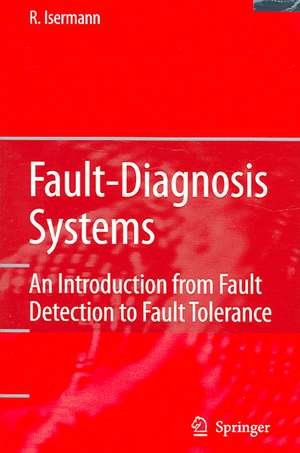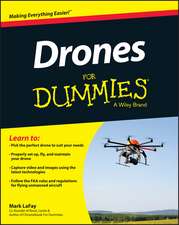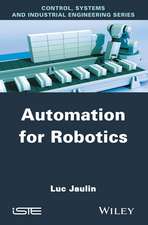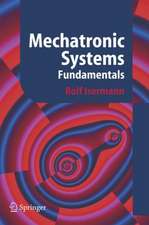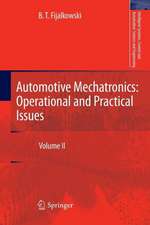Fault-Diagnosis Systems: An Introduction from Fault Detection to Fault Tolerance
Autor Rolf Isermannen Limba Engleză Paperback – 13 oct 2005
The book gives an introduction into advanced methods of fault detection and diagnosis (FDD). After definitions of important terms, the reliability, availability, safety and systems integrity of technical processes is considered. Then fault-detection methods for single signals without models like limit and trend checking and with harmonic and stochastic models, like Fourier analysis, correlation and wavelets are treated. This is followed by fault detection with process models using the relationships between signals like parameter estimation, parity equations, observers and principal component analysis. The treated fault-diagnosis methods include classification methods from Bayes classification to neural networks with decision trees and inference methods from approximate reasoning with fuzzy logic to hybrid fuzzy-neuro systems.
Especially for safety-critical processes fault-tolerant systems are required. Basic redundant structures like n-out-of-m systems, cold and hot standby are considered and ways to design fault-tolerant sensors, actuators and control systems are outlined.
Several practical examples for fault detection and diagnosis of DC motor drives, a centrifugal pump, automotive suspension and tire show applications.
Preț: 539.26 lei
Preț vechi: 634.42 lei
-15% Nou
Puncte Express: 809
Preț estimativ în valută:
103.22€ • 112.16$ • 86.76£
103.22€ • 112.16$ • 86.76£
Carte tipărită la comandă
Livrare economică 21 aprilie-05 mai
Preluare comenzi: 021 569.72.76
Specificații
ISBN-13: 9783540241126
ISBN-10: 3540241124
Pagini: 493
Ilustrații: XVIII, 475 p.
Dimensiuni: 155 x 235 x 27 mm
Greutate: 0.74 kg
Ediția:2006
Editura: Springer Berlin, Heidelberg
Colecția Springer
Locul publicării:Berlin, Heidelberg, Germany
ISBN-10: 3540241124
Pagini: 493
Ilustrații: XVIII, 475 p.
Dimensiuni: 155 x 235 x 27 mm
Greutate: 0.74 kg
Ediția:2006
Editura: Springer Berlin, Heidelberg
Colecția Springer
Locul publicării:Berlin, Heidelberg, Germany
Public țintă
ResearchCuprins
Fundamentals.- Supervision and fault management of processes — tasks and terminology.- Reliability, Availability and Maintainability (RAM).- Safety, Dependability and System Integrity.- Fault-Detection Methods.- Process Models and Fault Modelling.- Signal models.- Fault detection with limit checking.- Fault detection with signal models.- Fault detection with process-identification methods.- Fault detection with parity equations.- Fault detection with state observers and state estimation.- Fault detection of control loops.- Fault detection with Principal Component Analysis (PCA).- Comparison and combination of fault-detection methods.- Fault-Diagnosis Methods.- Diagnosis procedures and problems.- Fault diagnosis with classification methods.- Fault diagnosis with inference methods.- Fault-Tolerant Systems.- Fault-tolerant design.- Fault-tolerant components and control.- Application Examples.- Fault detection and diagnosis of DC motor drives.- Fault detection and diagnosis of a centrifugal pump-pipe-system.- Fault detection and diagnosis of an automotive suspension and the tire pressures.
Textul de pe ultima copertă
Supervision, health-monitoring, fault detection, fault diagnosis and fault management play an increasing role for technical processes and vehicles, in order to improve reliability, availability, maintenance and life-time. For safety-related processes fault-tolerant systems with redundancy are required in order to reach comprehensive system integrity.
This book gives an introduction into the field of fault detection, fault diagnosis and fault-tolerant systems with methods which have proven their performance in practical applications. It guides the reader in a structured tutorial style:
This book gives an introduction into the field of fault detection, fault diagnosis and fault-tolerant systems with methods which have proven their performance in practical applications. It guides the reader in a structured tutorial style:
- supervision methods, reliability, safety, system integrity and related terminology;
- fault detection with signal-based methods for periodic and stochastic signals;
- fault detection with process model-based methods like parameter estimation, state estimation, parity equations and principal component analysis;
- fault diagnosis with classification and inference methods;
- fault-tolerant systems with hardware and analytical redundancy;
- many practical simulation examples and experimental results for processes like electrical motors, pumps, actuators, sensors and automotive components;
- end-of-chapter exercises for self testing or for practice.
Caracteristici
Textbook from the highly praised father of fault tolerance Combines mathematical profoundness with an orientation towards industrial application With many elaborate examples
